| Title XI: Crop Insurance | |||
Title V: Credit
What it does: Authorizes lending by USDA’s Farm Service Agency, modifies rules for the Farm Credit System, and authorizes the State Agricultural Loan Mediation Program.
According to the Congressional Research Service, FSA provides about $13 billion of direct loans and guarantees another $17 billion in loans made by Farm Credit institutions and commercial banks. Direct USDA operating loans are capped at $400,000 while direct ownership loans are limited to $600,000. Guaranteed operating and ownership loans are capped at $1.8 million. Microloans are capped at $50,000.
The Farm Credit System, a government-sponsored enterprise, is regulated by the Farm Credit Administration under rules somewhat different from commercial banks and is largely restricted to lending to agricultural entities, producers and harvesters of aquatic products, farmer-owned agricultural processing facilities, farm-related businesses, ag cooperatives, rural utilities, and rural home buyers.
What's in play: Several farm groups as well as the Farm Credit Council and representatives of the commercial banking sector have called for increasing FSA loan limits, citing inflation and rising land prices.
Representatives of the Farm Credit Council asked the Senate Agriculture Committee to allow farm credit associations to boost investments in rural community facilities, including hospitals, rural clinics and skilled nursing facilities.
 As part of a pilot program that expired in 2014, Farm Credit financed community facility projects (hospitals, senior care centers, walk-in clinics, schools, childcare facilities, etc.) authorized by the FCA. Today, the FCA Board of Directors must provide specific and individual approval for each community facility investment made by each Farm Credit institution. The FCC argues that this is an inefficient approach to investing in community facilities and wants Congress to clarify their authority and encourage partnerships on these projects with community banks.
As part of a pilot program that expired in 2014, Farm Credit financed community facility projects (hospitals, senior care centers, walk-in clinics, schools, childcare facilities, etc.) authorized by the FCA. Today, the FCA Board of Directors must provide specific and individual approval for each community facility investment made by each Farm Credit institution. The FCC argues that this is an inefficient approach to investing in community facilities and wants Congress to clarify their authority and encourage partnerships on these projects with community banks.
The Farm Credit Council also wants to ensure all of their system lenders can make loans for fishing-related businesses such as lobster boat builders, marine engine repair businesses and bait suppliers.
The Independent Community Bankers Association has told lawmakers to keep the Farm Credit System restricted to farm lending.
The National Sustainable Agriculture Coalition says lenders making guaranteed loans should be required to follow FSA loan servicing regulations and meet target participation rates for beginning and socially disadvantaged farmers.
Notable marker bills:
H.R.2423 — A bipartisan proposal led by Rep. Brad Finstad, R-Minn., would require Farm Credit System institutions to ask borrowers who are small farmers to provide their race, sex, and ethnicity.
H.R.4736 — Bill led by Rep. Michelle Fischbach, R-Minn., to allow Farm Credit institutions to finance community facilities.
H.R.1495 and S.719 — The Farm Service Agency Loan Program Act, led by Rep. Randy Feenstra, R-Iowa, and Sen. Deb Fischer, R-Neb., would create a USDA loan program for helping farmers purchase precision agriculture equipment.
H.R. 3139 — Feenstra's The Credit for Our Rural Economy (Acre) Act would allow community banks to make agricultural real estate loans with tax exempt status on earned interest. Some home mortgages also would be eligible.
S. 1756 - A bipartisan proposal by Sens. Angus King, I-Maine, and Lisa Murkowski, R-Alaska. to allow fishing-related businesses to borrow from Farm Credit System lenders.






